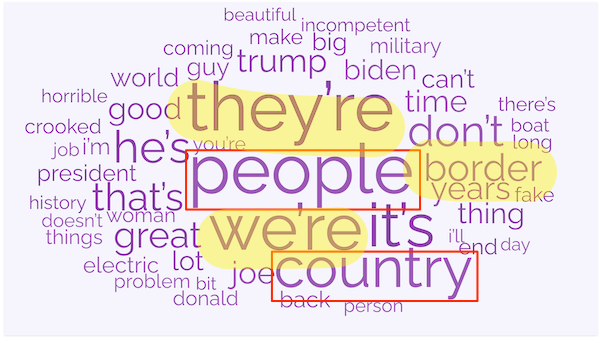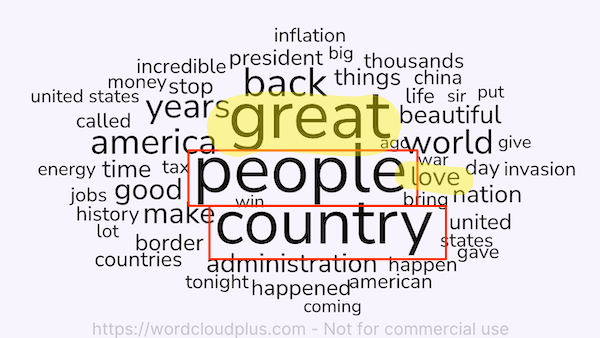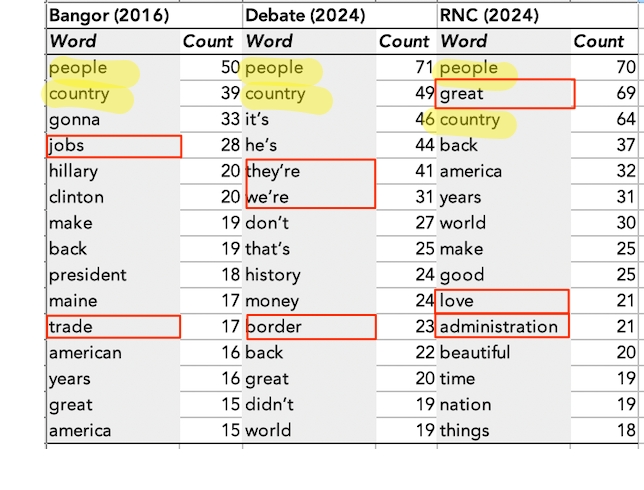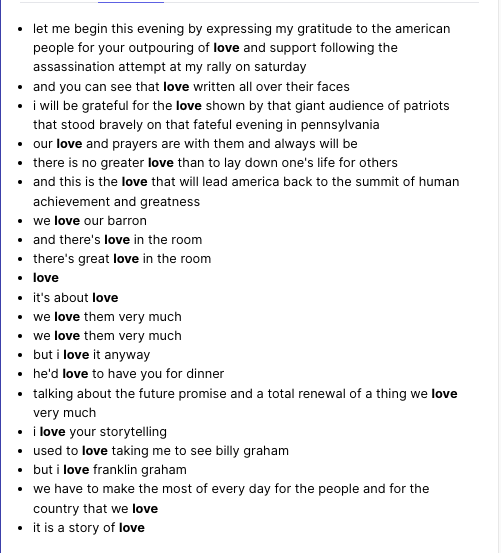By Lambert Strether of Corrente.
Vinnie Daniel: How come you don’t hate this guy? He is everything you taught us not to trust. Mark Baum: I can’t hate him. He is so transparent in his self interest that I kind of respect him.— The Big Short
Readers, I apologize. Given the headline, you have every right to the expectation that I’m going to pull on my yellow waders and do a close reading of Trump’s acceptance speech before the Republican National Convention. Unfortunately, Biden’s defenestration blotted out the sun — and sucked up all my time — and so I’ve had to scale back my ambitions. I’m sure I’ll have a chance to take up these themes again!
In this scaled back version, I will first look at “word clouds” for three of Trump’s speeches, showing consistent themes, but also differences. Then, I will consider the question of whether Trump might morph from a “Heel” to a “Face.” Finally, I will quote and analyze, in a cursory fashion, Trump on his own attempted assassination, and Trump’s appeal to the working class. I’ll conclude with a few brief remarks on the Trump and Biden Administrations. (Topics from Trump’s speech that I will not cover include war, energy, inflation, and the border, although these comprised the great bulk of the speech’s bulky verbiage.)
Trump: “People” and “Country”
Here are three world clouds (all made with WordCloud+): Trump in Bangor, Trump in Vegas, and Trump at the RNC:
Figure 1: 2016 (Bangor Cross Arena)

Figure 2: 2024 (Vegas)

Figure 3: 2024 (RNC Acceptance Speech)

As you can see, “people” and “country” — appropriately for a populist — have been Trump’s dominant themes for the last eight years, “our country,” or “this beautiful country” being a sort of counterpoint to the Democrat “our democracy.”
Of course, three speeches is a very small sample, and it would be fun to create a bigger one, but accepting that word counts can be said to be proxies for themes, here is a different look at the these world clouds data in tabular form:

In Bangor, after the top two, “people” and “country,” top themes were “jobs” and “trade,” appropriate to the state of Maine, but also (to the best of my recollection) themes of the entire campaign as well. In Vegas, again after “people” and “country,” we had a full-fledged Schmittian “friend/enemy” discourse (“they’re”/”we’re”) along the “border.” And at the RNC, “great” enters the top ranking, presumably because the “G” in MAGA stands for “Great.” But we also have “administration” — presumably to compare Trump’s to Biden’s — but also, and very strangely, “love” (of which more later). Let us now turn to Thomas Crooks’ attempt on Trump’s life:
Trump: The Assassination Attempt
In a remarkable year, one of the more remarkable events has been a Presidential candidate describing how it feels to almost be assassinated, and at his own nominating convention. I can’t think of an equivalent example[1]. Trump is not terse, so I’m going to edit this down seriously, eliminating the jazzy riffing and repetition, but hopefully you will get the flavor:
Let me begin this evening by expressing my gratitude to the American people for your outpouring of love and support following the assassination attempt at my rally on Saturday. As you already know, the assassin’s bullet came within a quarter of an inch of taking my life. So many people have asked me what happened. Tell us what happened. Please. And therefore, .
Trump leads with this; I’ve spoken to people who watched it, and “remarkable” was also their word. “I will tell you exactly what happened” is so simple and direct. And we’ll see if he keeps his promise:
It was a warm, beautiful day in the early evening in Butler Township in the great Commonwealth of Pennsylvania….
I heard a loud whizzing sound and felt something hit me really, really hard on my right ear.
I said to myself, wow, what was that? It can only be a bullet and moved my right hand to my ear, brought it down. My hand was covered with blood….
Service agents rushed to the stage, and they really did. They rushed to the stage.
These are great people at great risk, I will tell you. And pounced on top of me so that I would be protected. There was blood pouring everywhere, and yet in a certain way I felt very safe because I had God on my side. I felt that.
“I felt that” is also simple and direct. More:
The most incredible aspect of what took place on that terrible evening in the fading sun [indeed, 6:11 p.m. ET] was actually seen later. In almost all cases, as you probably know, and when even a single bullet is fired, just a single bullet. And we had many bullets that were being fired, crowds run for the exits or stampede, but not in this case. It was very unusual.
It’s as if Trump lifts the crowd up, and shows it to itself in a mirror. More:
Nobody ran, and by not stampeding, many lives were saved. But that isn’t the reason that they didn’t move. The reason is that they knew I was in very serious trouble. They saw it. They saw me go down. They saw the blood and thought, actually, most did that I was dead. They knew it was a shot to the head. They saw the blood.[2]
We don’t actually know that people thought Trump was dead. But it’s certainly plausible. And now the part that will get some voters, at least, to walk over broken glass to get to the polls to vote for him:
I’m not supposed to be here tonight. Not supposed to be here… I stand before you in this arena only by the grace of Almighty God.
And watching the reports over the last few days, many people say it was a providential moment. Probably was.
And the “iconic” moment. Trump, with the Secret Service agents huddled over him, protecting him with their bodies, looks out and sees the crowd:
When I rose surrounded by secret service, the crowd was confused because they thought I was dead. And there was great, great sorrow. I could see that on their faces .
[i.e., their reactions were not fake, something Trump is probably not used to]. They thought it was over, but I could see it. I wanted to do something to let them know I was okay. I raised my right arm, looked at the thousands and thousands of people that were breathlessly waiting and started shouting, fight, fight, fight!
Once my clenched fist went up, and it was high into the air. You’ve all seen that. The crowd realized I was okay and roared with pride for our country like no crowd I have ever heard before.
I think “pride for our country” transitions back to a more normal campaign mode; but what an extraordinary narrative. I don’t ever want to hear a similar narrative from another politician, but it’s hard for me to imagine another politician carrying the crowd with him as Trump did, whether in Butler, PA, or Milwaukee, WI.
Trump: Heel or Face?
The “Heel” and “Face” dichotomy derives from the art of kayfabe in the world of professional wrestling, a world in which Trump has moved (and may still move)[3]. From WikiPedia:
In professional wrestling, kayfabe (/ˈkeɪfeɪb/) is the portrayal of staged events within the industry as “real” or “true”, specifically the portrayal of competition, rivalries, and relationships between participants as being genuine and not staged. The term kayfabe has evolved to also become a code word of sorts for maintaining this “reality” within the direct or indirect presence of the general public.
Very much like politics. In these staged events, wrestlers assume characters:
The characters assumed by wrestlers can be distinguished into two alignments: faces and heels.
Faces, short for “babyfaces”, are hero-type characters whose personalities are crafted to elicit the support of the audience through traits such as humility, patriotism, a hard-working nature, determination, and reciprocal love of the crowd. Faces usually win their matches on the basis of their technical skills and are sometimes portrayed as underdogs to enhance the story.
Heels are villainous or antagonistic characters, whose personalities are crafted to elicit a negative response from the audience. They often embrace traditionally negative traits such as narcissism, egomania, unprompted rage, sadism, and general bitterness.
Above, I drew attention to Trump’s use of the word “love”; new for him, at least for this tiny sample. Here are WordCloud+’s usage examples of “love” in Trump’s RNC accepance speech:

The centrality of love is something a Face would extol, especially the Ultimate Face, Jesus of Nazareth. And so Trump, misquoting John 15:13 (to good effect: “others” for “friends”): “There is no greater love than to lay down one’s life for others.” Trump even gives a shout-out to Fred Trump, the worst father in the world, who “used to love taking me to see Billy Graham.” Of course, there is Hannibal Lector (“he’s love to have you for dinner”). However, most of the usage examples involve kayfabe’s “reciprocal love of the crowd” (“there’s great love in the room”). I myself wouldn’t classify that as love at all; it reminds me of the parasocial relations that K-Pop fans have with their favored artists (or, for that matter, Beatlemania). I’d be even more concerned if “love” interpreted in this latter sense turned into a binding force among “committed nationalist militants.”
Trump: The Working Class
Trump’s acceptance speech contains two passages of direct interest to the working class. The first is “tips,” typically framed as a narrative:
At the center of our plan for economic relief, our massive tax cuts for workers that include something else that stood out to be very popular, actually, here, it’s very popular in this building and all those hotels that I saw that are so nice. I’m staying in a nice one. It’s called no tax on tips, no tax on no tax on tips.
I got that by having dinner recently in Nevada, where we’re leading by about 14 points.
We’re having dinner at a beautiful restaurant in the Trump Building on the strip, and it’s a great building. And the waitress comes over. How’s everything going? Really nice person. How’s everything? Oh, Sarah. So tough. The government’s after me all the time on tips, tips, tips. I said, well, they give you a cash, would they be able to find me? She said, actually, they didn’t know that.
Here Trump plays both parts in a conversation, which he does quite a bit. More:
She said very little cash is given. It’s all put right on the check. And they come in and they take so much of our money, it’s just ridiculous. And they don’t believe anything we say and they’ve just tired, as you know, 88,000 agents to go after them. Even more.
And I said, this shows the level of, you know, most people go out, they hire consultants, they pay millions of dollars. But I said to her, let me just ask you a question. Would you be happy if you had no tax and tip? She said, what a great idea. . That’s better than spending millions of dollars.
And everybody, everybody loves it. Waitresses and caddies and drivers and everybody’s a large, large group of people that are being really hurt badly. They make money. Let them keep their money.
(I haven’t checked to see if there really is a “Sarah.”) Notice that Trump slams the PMC (“consultants”) and upholds the working class (“very smart waitress”). At a policy level, I’m not sure I want to encourage nobles throwing gold coins to the peasants as they pass by in their carriages any more than they already do, but there’s no denying that “more money in your pocket” has its own appeal.
And on globalization and unions:
And right now, as we speak, large factories just started are being built across the border in Mexico. So with all the other things happening on our border, and they’re being built by China to make cars and to sell them into our country. No tax, no anything. . And every single auto worker union and non union should be voting for Donald Trump, because we’re going to bring back car manufacturing and we’re going to bring it back fast.
They’re building some of the largest auto plants anywhere in the world. Think of it, in the world. And we’re going to bring it back. We’re going to make them we don’t mind the we don’t mind that happening. But those plants are going to be built in the United States. And our people are going to man those plant.
And if they don’t agree with us, we’ll put a tariff of approximately 100 to 200% on each car, and they will be unsellable in the United States.
We still have to built our own plants here, of course. But nevertheless!
Conclusion
One recent talking point from Democrats has been that the Republicans geared their whole campaign around Biden’s age. There’s no sign of that in this speec. Trump remarks:
They will not have done the damage that Biden has done, only going to use the term once. Biden. I’m not going to use the name anymore. Just one time.
Biden, or rather whichever Biden staffer is, or possibly was, in charge of his account, reacted to Trump’s acceptance speech as follows:
I’m stuck at home with COVID, so I had the distinct misfortune of watching Donald Trump’s speech to the RNC.
What the hell was he talking about?
— Joe Biden (@JoeBiden) July 20, 2024
And I think “What the hell was he talking about?” is a fair reaction, especially if you’ve got West Wing brain and conceive of a Presidential as a well-crafted script of policy talking points and the occasional clever aphorism. I’m still struggling through breaking down Trump’s rhetoric, because quite frankly I’m a big fan of terse, especially in others, but it seems to me that what Trump is all about is the relationship to a crowd, an actual, visible, tangible crowd. There, Trump is in his element, and everything he says — jazzy riffing, digressions, verbal oddities, religiosity, and all — is designed to maintain that connection. Very much unlike all other politicians in the field today.
NOTES
[1] In 1912, Teddy Roosevelt was shot while giving a speech and, also remarkably, continued on speaking. But he didn’t describe the shooting in the speech, let alone an acceptance speech.
[2] I cut this part out for brevity: “And there’s an interesting statistic. The ears are the bloodiest part. If something happens with the ears, they bleed more than any other part of the body. For whatever reason. The doctors told me that. They said, why is there so much blood? He said, it’s the ears. They bleed more. , but they just, they just, this beautiful crowd, they didn’t want to leave me. They knew I was in trouble. They didn’t want to leave me. And you can see that love written all over their faces.” “So we learned something.”
[3] Needless to say, “I don’t love Trump.” I’m looking at his work as an exercise in rhetoric. When I say “simple and direct,” for example, I’m not saying true; the most I might say is “plausible.” For all I know, to Trump the showman, the story of his assassination is genuine imitation kayfabe all the way down (I, for example, have been spoken to about mediating serious emotional events through literature, as opposed to direct and genuine feeling, whatever that may be).
[4] Interestingly, in kayfabe the crowd can also be a “pseudo-character”: “In the WWE Universe era, the crowd also can be spontaneously used, mostly as a Heel, either to distract promo, build more heat to heels, or used to distract referees on their count-outs to force a result, even when they have no physical power or rights to fight the wrestlers.” Trump, however, makes the crowd in Butler, PA a Face.














